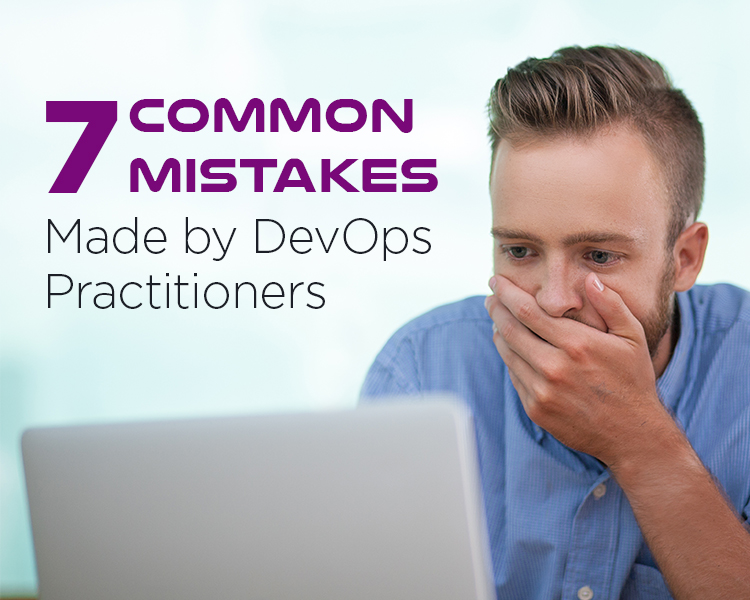
DevOps has become an important and inseparable part of every business. The dawn of DevOps has brought the development and operations teams together, largely contributing to the faster deployment of code and development of software that serves business purposes.
Despite the most obvious problems DevOps solves, there are some mistakes that practitioners and organizations commit whilst working to deliver what the organization demands. What they need to understand is that for a DevOps operation to be successful they should keep in mind its potential and shortcomings and think of innovative ways to put its strengths to use.
Let us look at some of the common mistakes committed during the DevOps implementation process:
1 Speed Vs. Quality
 In an attempt to meet the urgent need to develop software in accordance with the business needs, some organizations ignore the inexperience or lack of complete knowledge of DevOps and employ IT personnel that struggle to deliver effective DevOps products, resulting in frustration and the particular business staggering in the face of competition.
In an attempt to meet the urgent need to develop software in accordance with the business needs, some organizations ignore the inexperience or lack of complete knowledge of DevOps and employ IT personnel that struggle to deliver effective DevOps products, resulting in frustration and the particular business staggering in the face of competition.
The second aspect to consider under the Speed Vs. Quality criteria is that of neck-tight deadlines to meet. DevOps professionals are often in a mad pursuit of getting the job done without considering the testing process or with insufficient testing. This leads to glitches and malfunctioning in the later stages.
2 DevOps – A Practice, Not a Group of People
 Most organizations are so smitten by the term ‘DevOps’ that their minds get automatically trained to employ people to form a separate team with the department named ‘DevOps’. This is a wrong approach, instead, it only adds to the complexity of executing a DevOps.
Most organizations are so smitten by the term ‘DevOps’ that their minds get automatically trained to employ people to form a separate team with the department named ‘DevOps’. This is a wrong approach, instead, it only adds to the complexity of executing a DevOps.
Yes, organizations should have a team dedicated to DevOps practices but that should not lead to the creation of a separate entity.
Secondly, there is also a tendency for organizations to employ DevOps professionals with the mindset that they will fix all DevOps-related issues, without completely understanding the job requirement, by themselves.
This can lead to the employed professionals being unable to find ground between Development (Dev) and Operations (Ops); they keep juggling between the challenges of the individual processes.
3 Setting Unrealistic Goals
 Organizations fail to conceive DevOps as an exceptional process. It is treated like any other process that is managed on a day-to-day basis. By doing this, they set unrealistic deadlines and other goals for Dev and Ops teams making it difficult and confusing to deliver the expected results.
Organizations fail to conceive DevOps as an exceptional process. It is treated like any other process that is managed on a day-to-day basis. By doing this, they set unrealistic deadlines and other goals for Dev and Ops teams making it difficult and confusing to deliver the expected results.
Especially in big organizations where they have complex processes, it is difficult to draft DevOps strategies.
4 Falling Prey to Rigidity
 DevOps implementation is majorly hampered by the rigid nature it possesses. But, it is necessary to stick to the core principals of DevOps.
DevOps implementation is majorly hampered by the rigid nature it possesses. But, it is necessary to stick to the core principals of DevOps.
However, the process allows DevOps practitioners to implement smart modifications in accordance with the organization needs. Principles are crucial to the initial implementation stages and make sure that the support systems of DevOps stay stable to brace any impact in the future.
These principles are however adapting themselves to modifications in accordance with internal standards. However, when the result does not meet expectations, DevOps personnel will need to be prepared to go back and identify the reason for the diversion.
5 No Monitoring Required
 It would not be wise of organizations to believe that the role of DevOps engineers or the operations personnel ends with the release of the application or software.
It would not be wise of organizations to believe that the role of DevOps engineers or the operations personnel ends with the release of the application or software.
DevOps processes & tools need constant monitoring and overseeing. The organization has to constantly ensure the availability of budgets, additional goals, resources and the continuous functioning of the software/application.
A well-thought-through DevOps implementation plan never quits learning at any stage and neither does it stop improving.
6 Moving with the Old and the New
 Some organizations tend to hold on to old practices and personnel while switching to DevOps. This is known as a ‘Hybrid DevOps’ model. In this model, some parts of the IT are streamlined whereas the other parts are allowed to continue at their earlier pace.
Some organizations tend to hold on to old practices and personnel while switching to DevOps. This is known as a ‘Hybrid DevOps’ model. In this model, some parts of the IT are streamlined whereas the other parts are allowed to continue at their earlier pace.
While it’s a move they made considering their existing capital and resources, they are in for a big backfire as the application of a modern work methodologies cannot always co-exist with age-old practices.
7 Inconsiderate About Security
 Organizations completely miss out on security while implementing DevOps practices. Security is crucial to software and applications deployed through DevOps, as much as security to the overall information in the possession of the organization.
Organizations completely miss out on security while implementing DevOps practices. Security is crucial to software and applications deployed through DevOps, as much as security to the overall information in the possession of the organization.
Especially when an organization journeys towards micro-services framework, security becomes a matter of concern as different applications interact with each other.
On an EndNote
DevOps is a smart practice that is a result of two of the most crucial teams to any business. If applied correctly then it can take a company to newer heights and establish it as a leading brand among competition. Therefore, it is crucial for organizations to consider all the above factors to bring out the best results of this practice.
More On DevOps: